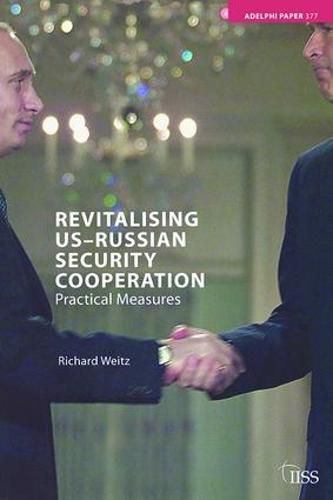Readings Newsletter
Become a Readings Member to make your shopping experience even easier.
Sign in or sign up for free!
You’re not far away from qualifying for FREE standard shipping within Australia
You’ve qualified for FREE standard shipping within Australia
The cart is loading…






Russia and the United States are the most important countries for many vital security issues. They possess the worlds largest nuclear weapons arsenals, are involved in the principal regional conflicts, and have lead roles in opposing international terrorism and weapons proliferation. Despite persistent differences on many questions, mutual interests consistently drive Russians and Americans to work together to overcome these impediments.
This Adelphi paper argues that opportunities for improving further security cooperation between Russia and the United States exist but are limited. Near-term results in the areas of formal arms control or ballistic missile defences are unlikely. The two governments should focus on improving and expanding their joint threat reduction and nonproliferation programmes, enhancing their military-to-military dialogue regarding Central Asia and defence industrial cooperation, and deepening their antiterrorist cooperation, both bilaterally and through NATO. Using more market incentives, expanding reciprocity and equal treatment, and limiting the adverse repercussions from disputes over Iran would facilitate progress.
Russia and the United States will not soon become close allies, but they should be able to achieve better security ties given that, on most issues, their shared interests outweigh those that divide them.
$9.00 standard shipping within Australia
FREE standard shipping within Australia for orders over $100.00
Express & International shipping calculated at checkout
Stock availability can be subject to change without notice. We recommend calling the shop or contacting our online team to check availability of low stock items. Please see our Shopping Online page for more details.
Russia and the United States are the most important countries for many vital security issues. They possess the worlds largest nuclear weapons arsenals, are involved in the principal regional conflicts, and have lead roles in opposing international terrorism and weapons proliferation. Despite persistent differences on many questions, mutual interests consistently drive Russians and Americans to work together to overcome these impediments.
This Adelphi paper argues that opportunities for improving further security cooperation between Russia and the United States exist but are limited. Near-term results in the areas of formal arms control or ballistic missile defences are unlikely. The two governments should focus on improving and expanding their joint threat reduction and nonproliferation programmes, enhancing their military-to-military dialogue regarding Central Asia and defence industrial cooperation, and deepening their antiterrorist cooperation, both bilaterally and through NATO. Using more market incentives, expanding reciprocity and equal treatment, and limiting the adverse repercussions from disputes over Iran would facilitate progress.
Russia and the United States will not soon become close allies, but they should be able to achieve better security ties given that, on most issues, their shared interests outweigh those that divide them.